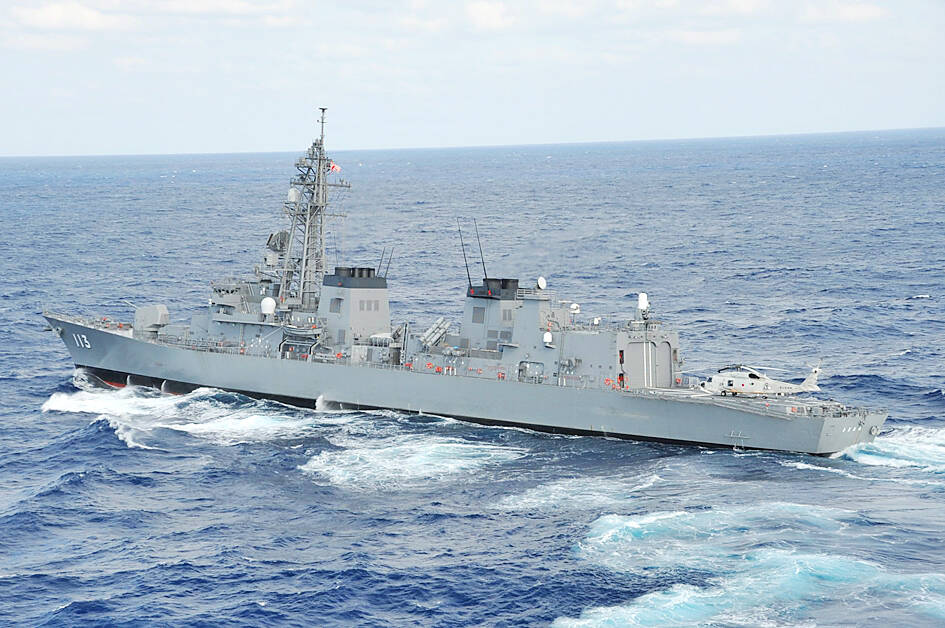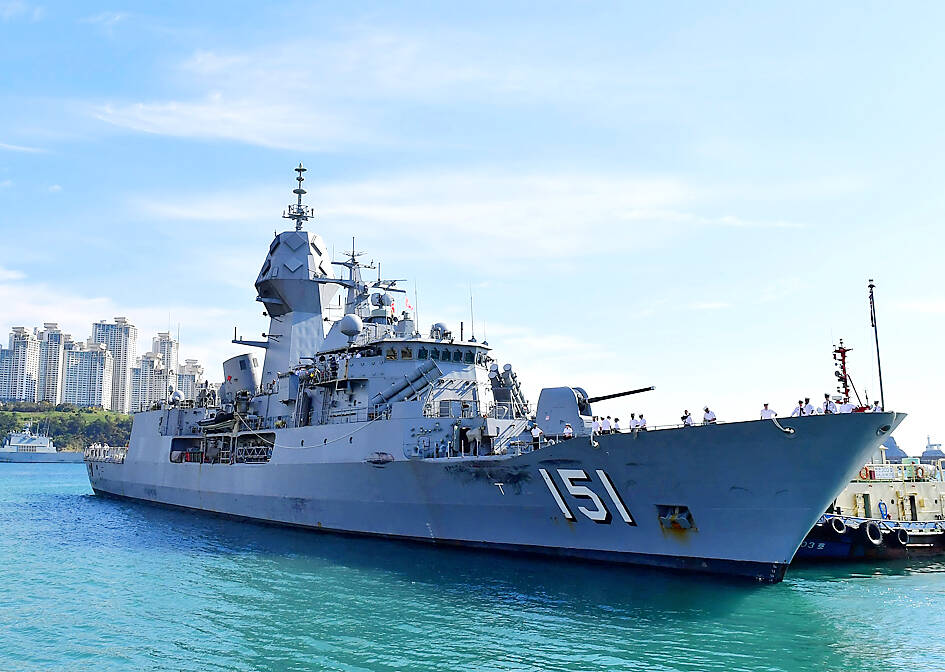The Japan Maritime Self-Defense Force on Wednesday made its first-ever transit through the Taiwan Strait in response to the intrusion by a Chinese reconnaissance aircraft into Japan’s sovereign airspace last month, Yomiuri Shimbun reported yesterday.
The Japanese news platform reported that the destroyer JS Sazanamisailed down through the Taiwan Strait on Wednesday, citing sources in the Japanese government with knowledge of the matter.
Japanese Chief Cabinet Secretary Yoshimasa Hayashi declined to comment on the reports at a regular briefing because they concern military operations.

Photo courtesy of the Japanese Ministry of Defense
Military vessels from New Zealand and Australia also sailed through the Strait on the same day, Wellington’s defense ministry said yesterday.
One of its ships, the HMNZS Aotearoa, made its first passage through the Taiwan Strait in seven years, alongside the Australian guided missile destroyer HMAS Sydney to assert the “right of freedom of navigation,” a defense source said.
The official added that the mission was not conducted with Japan.

Photo: EPA-EFE
The three nations were scheduled to engage in a joint military exercise in the South China Sea yesterday, Japanese media reported.
Japanese Prime Minister Fumio Kishida ordered the transit as a response to the incursion last month by a Chinese People’s Liberation Army (PLA) Y-9 reconnaissance aircraft into Japanese airspace after consulting with his Cabinet, the report said.
The Chinese aircraft entered Japan’s airspace at 11:29am on Aug. 26 from east of the Danjo Islands and left the area at 11:31am.
On Wednesday last week, the Chinese aircraft carrier Liaoning and two other PLA ships entered Japan’s contiguous zone while sailing through the area between Japan-governed Yonaguni Island and Iriomote Island.
Bec Strating, professor of international relations at La Trobe University, said Japan’s reported Taiwan Strait transit “is part of a broader pattern of greater naval presence by countries in and beyond Asia that are concerned about China’s maritime assertions.”
“Japan in particular has been dealing with China’s ‘gray zone’ tactics in the East China Sea,” including an increasing number of coast guard vessels sailing close to disputed islands in the region, she said.
The US and Canada have sailed through the Taiwan Strait numerous times before.
On Sept. 13, a German frigate and a supply ship sailed through the Taiwan Strait en route to Jakarta, marking the first such transit in 22 years.
It was followed on Tuesday last week by the passage of a US P-8A Poseidon maritime patrol aircraft through the Strait.
The next day, China’s Liaoning aircraft carrier sailed through the waters northeast of Taiwan, followed by the incursion on Monday of a Russian Il-38 patrol aircraft near Japan’s Hokkaido.
Additional reporting by Aaron Tu

‘FORM OF PROTEST’: The German Institute Taipei said it was ‘shocked’ to see Nazi symbolism used in connection with political aims as it condemned the incident Sung Chien-liang (宋建樑), who led efforts to recall Democratic Progressive Party (DPP) Legislator Lee Kun-cheng (李坤城), was released on bail of NT$80,000 yesterday amid an outcry over a Nazi armband he wore to questioning the night before. Sung arrived at the New Taipei City District Prosecutors’ Office for questioning in a recall petition forgery case on Tuesday night wearing a red armband bearing a swastika, carrying a copy of Adolf Hitler’s Mein Kampf and giving a Nazi salute. Sung left the building at 1:15am without the armband and apparently covering the book with a coat. This is a serious international scandal and Chinese

PERSONAL DATA: The implicated KMT members allegedly compiled their petitions by copying names from party lists without the consent of the people concerned Judicial authorities searched six locations yesterday and questioned six people, including one elderly Chinese Nationalist Party (KMT) member and five KMT Youth League associates, about alleged signature forgery and fraud relating to their recall efforts against two Democratic Progressive Party (DPP) legislators. After launching a probe into alleged signature forgery and related fraud in the KMT’s recall effort, prosecutors received a number of complaints, including about one petition that had 1,748 signatures of voters whose family members said they had already passed away, and also voters who said they did not approve the use of their name, Taipei Deputy Chief Prosecutor

UNDER ATTACK: Raymond Greene said there were 412 billion malicious threats in the Asia-Pacific region in the first half of 2023, with 55 percent targeting Taiwan Taiwan not only faces military intimidation from China, but is also on the front line of global cybersecurity threats, and it is taking action to counter those attacks, President William Lai (賴清德) said yesterday. Speaking at the opening of this year’s Cybersec Expo in Taipei, the president assured foreign diplomats and exhibitors that Taiwan remained committed to strengthening its defense against cyberattacks and enhancing the resilience of its digital infrastructure. Lai referenced a report from the National Security Bureau (NSB) indicating that the Government Service Network faced an average of 2.4 million intrusion attempts daily last year, more than double the figure

Retired US general Robert B. Abrams reportedly served as adviser to Chief of the General Staff Admiral Mei Chia-shu (梅家樹) during the Ministry of National Defense’s computer-simulated war games in the buildup to this year’s 41st annual Han Kuang military exercises, local media reported yesterday. For 14 days and 13 nights starting on April 5 and ending yesterday, the armed forces conducted the computer-simulated war games component of the Han Kuang exercises, utilizing the joint theater-level simulation system (JTLS). Using the JTLS, the exercise simulated a continuous 24-hour confrontation based on scenarios such as “gray zone” incursions and the Chinese People’s Liberation